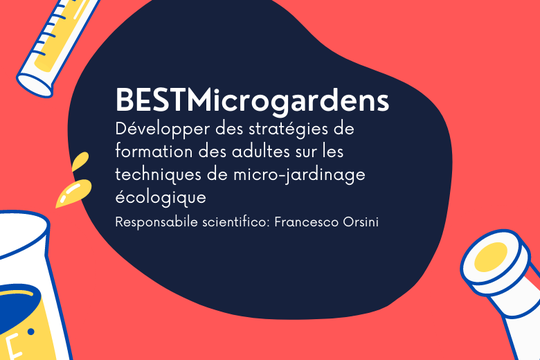Scientific officer:
Francesco Orsini
Duration:
01/12/2021 - 01/04/2024
Research group:
Giuseppina Pennisi, Elisa Appolloni, Vito Aurelio Cerasola, Mohammad Kazem Souri, Giorgio Prosdocimi Gianquinto, Erika Carnevale
Micro-gardens and the practice of micro-gardening are increasingly present throughout the world, especially in urban areas. Originally designed as an above-ground garden to effectively compensate for the lack of cultivable land in urban areas, the micro-garden has proven to be suitable for other contexts, depending on multiple constraints: scarcity of land, social and climatic constraints, etc. Too often perceived as a leisure for favored urban populations, the microgarden is nevertheless potentially accessible to all types of populations, in particular the most economically fragile, because it can be carried out with recovery supports, requiring little investments and maintenance costs, and based on agricultural practices that are often easy to master once acquired. Thus, micro-gardening is a practice: - Ecological because economical in inputs (with cultivation methods mostly based on the principles of integrated pest management, plant associations), efficient in water use (less than 2 liters per square meter per day in temperate zones), favoring the reduction of greenhouse gas effects. - Promoting quality self-feeding: micro-gardening is fully in line with the current European trend of relocation and food autonomy, by allowing families to meet part of their food needs with quality products. - Accessible to all types of audiences with a little interest in gardening - Adapted to certain economic projects in urban or fragile areas: horticultural entrepreneurs can develop micro-gardening techniques to produce in remunerative quantities under conditions where cultivation in open fields is constrained. - Adapted to regions where physical or land constraints make agriculture difficult and limit food autonomy (humid tropical regions, desert or boreal regions). Ecological micro-gardening could ide-ally meet the needs of the poorest European populations, who are those who suffer the most from food insecurity and its consequences on health. BEST Microgardens aims to meet the needs identified with 4 distinct and complementary target groups: - Actors of social integration and the fight against poverty, including associations fighting against food insecurity: they are in demand for tools, methods and resources to promote diversification and food quality from their target audiences, prevent food insecurity and the resulting health problems, reduce dependence on food banks - People in precarious
situations, which are the most affected by both under and malnutrition, and who have almost no access to quality fruits and vegetables for economic reasons - People with a project for economic integration through agriculture, in particular in the outermost regions where local agriculture is based on a multi-activity model and little available land (Guyana, Guadeloupe, Martinique, etc.): they are in demand for techniques and methods that make it possible to strengthen and diversify their productions at a lower cost and adapted to their environmental constraints - Gardening associations which still have little mastery of ecological micro-gardening techniques and wish to strengthen their interventions in the direction of the most vulnerable populations.

